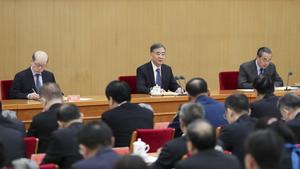 China's top political adviser Wang Yang (center) speaks at a conference on Taiwan affairs in Beijing on Sunday. (PHOTO / XINHUA)
China's top political adviser Wang Yang (center) speaks at a conference on Taiwan affairs in Beijing on Sunday. (PHOTO / XINHUA)
The Chinese mainland has the initiative and the overwhelming advantage in politics, economy and military when handling the Taiwan question and thwarting secession efforts by Taiwan separatists and foreign interference, experts said.
Patience and maintaining a strategic fortitude by the mainland are more valuable than ever as growing uncertainties and difficulties will loom over cross-Straits relations in the next few years, they added.
During a conference on Taiwan affairs in Beijing on Sunday, China's top political adviser Wang Yang said the situation in the Taiwan Straits will be grimmer and more complicated this year, and China will adamantly oppose and hold back any attempts by Taiwan separatists.
Wang, a member of the Standing Committee of the Political Bureau of the Communist Party of China Central Committee and chairman of the National Committee of the Chinese People's Political Consultative Conference, also called for various government bodies and agencies related to Taiwan affairs to align their actions and thoughts with the central government in upholding the one-China principle and resolutely oppose any forms of secessionist activities.
At the same time, Wang said, there should be more specific and targeted measures that can effectively benefit the livelihoods of Taiwan compatriots, and optimize the dialogue and cooperation mechanisms to promote joint development.
The Chinese mainland will also promote exchanges between youths from across the Taiwan Straits and create more welcoming conditions for young Taiwan compatriots to study, intern, launch startups and work on the mainland, he added.
Wang Yi, state councilor and foreign minister, said in a new year's reception on Monday that the one-China principle is a common consensus among the international community and an established international norm.
"No matter how Taiwan's internal situations change, the history and legality of Taiwan being an inseparable part of China are immutable," he said. "The resolve and confidence for reunification by the Chinese government and its people are also unshakable."
The latest remarks by Chinese officials came after Tsai Ing-wen of the pro-secession Democratic Progressive Party was reelected as Taiwan's leader in January. After the election, Tsai told foreign media that Taiwan was already an "independent country" and reunification by force will be costly for Beijing.
In response, Ma Xiaoguang, a spokesman for the State Council's Taiwan Affairs Office, said in a news briefing last week that Tsai should not misjudge the situation and create more tension.
"Taiwan is a sacred and inalienable part of China," he said. "Anyone who dares to challenge this fact is doomed to fail and will bring ruin upon themselves."
When asked about the rising sentiment for forced unification by the mainland public, Ma said the island's ruling party and Taiwan separatist forces are to blame for this situation.
"They should do some soul searching and think carefully about where they are taking Taiwan and cross-Straits relations," he said.
Li Haidong, a professor of US studies at China Foreign Affairs University, said peaceful reunification will remain the top priority for the mainland, though actual measures need to be more applicable and specific in the future.
Moreover, Li said one of the biggest uncertainties in cross-Straits relations this year is the United States, who has laid down a set of legislative frameworks to intervene in the Taiwan question over the last few years.
"These domestic laws will instigate the US to be more adventurist and radical when handling the issue," he said. "This year, we might see the US breaking traditional norms and engaging with Taiwan in unexpected ways," he said.
Some examples include meetings between high-ranking government or military officials, selling more advanced weaponry, deploying new task forces on islands near Taiwan, and holding more elaborate joint military drills.
This year is also an election year for the US and "we might see US politicians playing the Taiwan card when dealing with China," he said. "We need to expect and be prepared for more radical rhetoric and actions from the US."


